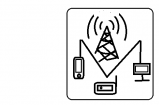How To Preapre For CCNA | CCNA Full Course | Network Components
In this video we will learn How To Preapre For CCNA | CCNA Full Course | Network Components. The Cisco CCNA 200-301 certification is a widely recognized certification in the field of networking. The course covers a wide range of topics, including network fundamentals, network access, IP connectivity, IP services, security fundamentals, and automation and programmability. The course typically includes a combination of classroom instruction, hands-on lab exercises, and self-study materials. Some of the specific topics that may be covered in a CCNA 200-301 course include routing and switching, network security, wireless networking, and network troubleshooting. To earn the CCNA certification, you will need to pass the Cisco CCNA 200-301 exam.
There are several components that make up a computer network. Some of the key components include:
1. Network Interface Card (NIC): A NIC is a hardware component that connects a device to a network. It contains a unique Media Access Control (MAC) address that is used to identify the device on the network.
2. Routers: A router is a networking device that forwards data packets between computer networks. It uses routing tables and protocols to determine the best path for data to travel.
3. Switches: A switch is a networking device that connects multiple devices together on a network. It forwards data packets to the appropriate device based on the MAC address of the destination device.
4. Hubs: A hub is a networking device that connects multiple devices together on a network. It broadcasts data packets to all connected devices, regardless of the destination device’s MAC address.
5. Firewalls: A firewall is a security device that controls access to a network. It uses rules and policies to allow or block traffic based on specified criteria.
6. Access Points: Access points are wireless networking devices that connect wireless devices to a wired network. They typically use the 802.11 standard to communicate with wireless devices.
7. Modems: A modem is a device that converts digital signals from a computer into analog signals for transmission over a telephone line or cable.
8. Servers: A server is a computer or device that manages resources and provides services to other devices on a network.
9. Cables: Cables are used to connect devices to a network. There are different types of cables such as Ethernet cables, fiber optic cables, coaxial cables, etc.
#How_To_Preapre_For_CCNA
#Cisco CCNA 200-301 Full Course
#CCNA_200_301_Full_Course
#How_To_Learn_CCNA_At_Home
#ccna_200_301_full_course_in_english
#ccna_training
#cisco_ccna_certification
#cisco_home_ccna
#ccna_security
Related Keywords: ccna exam,how to study for ccna,new ccna,network engineer,packet tracer,ccna security,why ccna?,ccna full course,best ccna,ccna study,ccna course,ccna full course,ccna fundamentals,ccna routing and switching,ccna 200-301 full course english,ccna security,ccna study guide,network engineer,free ccna,new ccna, ccna study,ccna course,ccna full course,ccna fundamentals,ccna routing and switching,ccna 200-301 full course english,ccna security,ccna study guide,network engineer,free ccna,new ccna
Disclaimer:-
———————————————————————————–
This channel may use some copyrighted materials without specific authorization of the owner but the contents used here fall under the “Fair Use”
Copyright Disclaimer under Section 107 of the Copyright Act 1976, allowance is made for « fair use » for purposes such as criticism, comment, news reporting, teaching, scholarship, and research. Fair use is a use permitted by copyright statutes that might otherwise be infringing. Non-profit, educational, or personal use tips the balance in favor of fair use.
Views : 0
network engineer




